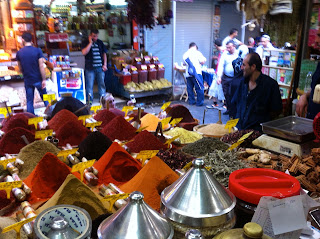 |
| In Istanbul's spice market: No Yelp here |
Nevertheless, most of our "stay" decisions have been made with Tripadvisor.com, a consumer rating system for tourist destinations around the world. Tripadvisor's power of course is the ability of real people to describe their experiences and rate them -- the more positive ratings by the more enthusiastic guests, the higher the tourist site ranks.
I'm quite sure some operators try to game the system but the biggest problem could be the concept of consistency -- that is, if many people rate a place highly, even if someone has a less-than-perfect experience, he might be less-than-eager to share it for fear of not belonging to the crowd. Of course, there are mavericks, and ironically, a perfectly positive ranking by hundreds of people without even a single negative comment would appear to be staged, even if it is true.
I can't say how much really high Tripadvisor ratings affect businesses, but imagine small operators with minuscule marketing budgets who manage to receive really high ratings do quite well from the experience. Certainly some commercial tour operators use their high rankings in their other marketing materials.
Fair enough. Contractors aren't in the tourism business but we have Yelp and similar services. And the issue here is, can contractors encourage clients to give positive rankings and can Yelp, perhaps hoping to sell advertising or (if you wish to see things from a more honorable level), seeking to avoid gaming the system, filter the positive reviews that don't seem to be quite right? (The problem with Yelp, I'm afraid, is the implicit link between advertising and ratings, which merchants and contractors may perceive, whether it be true or not.)
I don't have a simple answer to the best way to approach and use ratings services in marketing our businesses, but certainly they need to be regarded with respect and care, especially if you serve consumer-focused markets. You can add your own comments here.









No comments:
Post a Comment